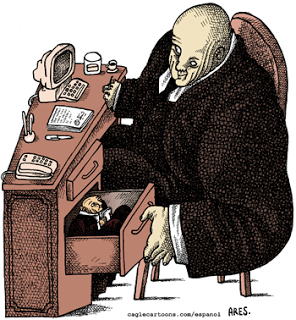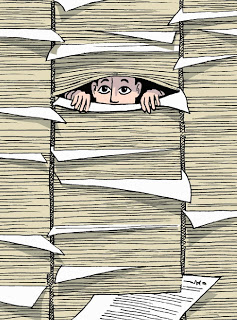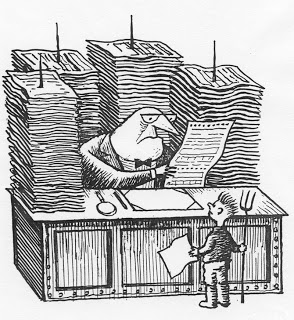The American Deep State
By Daniel Greenfield
SultanKnish.Blogspot.com
Few myths are as beloved among liberals as the
idea that wars could be put down to a conspiracy of
defense contractors. Throw together Haliburton,
Northrop Grumman and GE along with some retired
generals and you have the makings of your next war.
The fabled military-industrial complex was a
dimwitted descendant of the WW1 era Socialist notion
that wars were the product of industrialists and
without them, the working peoples of every country
would naturally get along. Then came WW2, which was
fought between a Communist empire, a National
Socialist oligarchy, a Socialist American government
and a Britain that would kick out Churchill as soon
as the war was over and swap him out for Labour and
the Socialist dream.
None of these Socialist or aspiring Socialist
systems could get along. The Nazis and Commies had
started out by looting their own citizens, the Nazis
based on religion and ethnicity, and the Commies,
based on these things and a thousand others, and the
mere existence of wealth, and when all that money
was gone, and the paintings were sold and the only
hope lay in sending tanks across the border, went to
war.
WWII was arguably the first Socialist world war in
which two countries committed to ridiculously
unworkable economic and political ideas set off on a
massive looting and killing spree across Western and
Eastern Europe. The Nazis shipped the loot back
home, practicing a familiar form of wealth
redistribution by turning over stolen property from
conquered countries to their own people as the
spoils of war while funneling much of the rest into
the corrupt machinery of the Nazi Party. The
Communists were less generous with their people, but
plenty of Russian soldiers still brought home
unknown luxuries from the formerly prosperous
capitals of captured countries.
The Soviet Union bought a little more time with an
empire that stretched all the way to Germany, but
the economic collapse still came. With no more
territories to seize and no more wealth to steal,
the Socialist Motherland became a pitiful backwater
full of secondhand copies of Western technology and
buildings where KGB trolls thought up increasingly
nasty schemes that could damage the West, but could
not destroy it or salvage the Bolshevik experiment.
And eventually they just gave up.
The West learned nothing from these experiences as
the infamous military-industrial complex learned to
take a backseat to the social-welfare complex which
was a good deal bigger and more ambitious. There's
only so much money that any country can spend on
weapons. And weapons, unlike social welfare
programs, can be scrapped.
The big idea of the Twentieth, the militarization
and industrialization of every aspect of society
proceeded with grim regularity with no regard for
the myths of the 50s as conformist or of the
succeeding decades as countercultural. No matter
what the kids were wearing in their hair, the
massive bureaucracies continued expanding, grinding
on and recruiting those same kids to come up with
great new ways to solve all the problems of society
with an even bigger bureaucracy.
The military-industrial complex had its ups and
downs, but the social-welfare complex kept getting
bigger and bigger. Every aspect of life was
industrialized, regulated and militarized, but it
wasn't the fictional militarization that frenzied
pacifists imagine, but real life militarization,
which means being subjected to a ridiculously
incompetent bureaucracy incapable of getting
anything right. There was a plan for everything, but
like the Five Year Plans in Mother Russia, they
never actually worked.
The difference, most reasonable people would point
out, is that we were still democracies, which is to
say that we voted for things. And the thing we voted
for was rule by politician-lawyers whom we knew that
we couldn't trust even before we voted for them. But
voting was one of those perverse rituals that
reminded us that we were free. We might have very
little ability to get the bureaucratic monkey off
our backs, but once every few years we could could
vote in a different politician-lawyer.
Not that it made that much of a difference.
The Supreme Court recently decided that the Defense
of Marriage Act was illegitimate because a majority
of the unelected lawyer-judges on the bench decided
that they didn't like it. A number of State Attorney
Generals then announced that they weren't going to
defend state laws on gay marriage, even though that
is their job, because they didn't like them.
And there was no reason to be surprised by any of
that. Federal judges had been invalidating
referendums, elections and bills for a while on the
grounds that they didn't like them. For all the
empty legalisms, it rarely came down to more than a
political disagreement with the balance of power
resting firmly with a handful of political
appointees.
The idea that the country ought to be run by the
people, rather than by the people who know best,
lasted somewhere from Andrew Jackson and until
shortly after the Civil War. It was buried in an
unmarked grave with the political career of Theodore
Roosevelt, whose ideas frightened the hell out of
both parties.
We still have elections and we still have
presidents and like referendums, these are things
that we're allowed to have so long as we don't step
too far out of line. In Europe, where third parties
and fourth and fifth parties, are easier to
organize, dangerously populist political movements
are disqualified from public office. It would be
nice to think that it couldn't happen here, but it
could and would.
For now the current system makes that a minimal risk
scenario, but if the political elites woke up
tomorrow morning to polling that showed that
Congress and the White House were about to be
claimed by a new third party committed to closing
the border, ending all international agreements,
ending Federal control over interstate commerce and
shutting down the EPA; there would within short
order be a whole bundle of rulings removing the
party and its candidates from contention.
We're allowed to have elections because we vote for
Democrats or Republicans. The ballot box is a toy
that we're allowed to play with because we've shown
that despite some scary moments, we won't use it to
burn down the system. If we ever did go rogue, the
ballot box would be taken away from us, the bad
names would get scrubbed off the lists and the
administrators of the nanny state would then give it
back to us with a stern warning to mend our ways.
This isn't North Korea or Iran. Our elections are
real for the most part. But so is gambling in Vegas.
Just because the game is reasonably honest, doesn't
mean that it still isn't rigged. The officials we
elect and the officials they select, for the most
part, follow the game plan of the social-welfare
complex. They do what they are told and they make us
do what we are told. That is their job. Electing
them gives them influence over us. It doesn't give
us influence over them.
There's no tyranny. No men with guns in dark rooms.
Just a massive sprawling government whose scale and
complexity no one can even begin to encompass. Each
part of it is another bureaucratic fiefdom whose
employees have long since learned to justify its
existence and need for expansion. And the people we
elect surround themselves with those employees and
get their information from them. The framework of
their worldview comes from that same bureaucratic
empire.
A president can defy one arm of the social-welfare
complex. He can take it on in a pitched battle,
appoint a close ally to run it, purge its members
and twist and turn it around to doing his bidding.
And after that exhausting battle, not only will the
department or agency eventually revert to form, but
he will doubtfully have the energy and popularity to
do it to more than a few departments or agencies.
The social-welfare complex is just too big. It's a
deep state that runs the country pursuing liberal
policies regardless of who is in office. While
the military-industrial complex is regularly purged
by liberals in the White House (the current one has
wrecked the military and even space exploration
while turning the military into a promoter of Green
Energy and gay rights) the social-welfare complex
hardly ever is. For one thing it's too complex and
is woven too deep into everything.
When the radicals announced that they were going to
switch from trying to blow up the system to working
within the system, this is the system that they
meant. It's where government really happens, at that
intersection between private think tanks and
government agencies where the planning takes place
and the proposals become policies and the policies
are presented to whoever won the next election
accompanied by spreadsheets and pie charts which
explain that it's the only answer, and if whoever it
is dismisses it, they implement it anyway.
The American Deep State consists of that deep fried
and congealed mass of bureaucratic collectivism
which despite its inertia is constantly growing.
It's not a state within a state. That would be a
better description of our elected officials. It is
the state.




